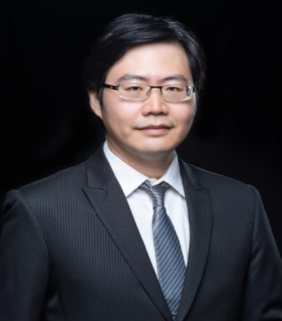
Prof. Tsung-Hui Chang IEEE Fellow The Chinese University of Hong Kong, Shenzhen | Tsung-Hui Chang is a Full Professor and Associate Dean (Education) at the School of Science and Engineering, The Chinese University of Hong Kong, Shenzhen, China, and Shenzhen Research Institute of Big Data. His research interests lie in optimization problems in data communications and machine learning. He is an Elected Member of IEEE SPS SPCOM TC and the Founding Chair of IEEE SPS ISAC TWG. He received the IEEE ComSoc Asian-Pacific Outstanding Young Researcher Award in 2015, and the IEEE SPS Best Paper Award twice in 2018 and 2021. He is currently a Senior Area Editor of IEEE TSP and an Associate Editor of IEEE OJSP. He is a Fellow of IEEE. Title: Aligning Model with Human Feedback: A Ranking based Zeroth-order Optimization Method Abstract: In this study, we delve into an emerging optimization challenge involving a black-box objective function that can only be gauged via a ranking oracle—a situation frequently encountered in real-world scenarios, especially when the function is evaluated by human judges. A prominent instance of such a situation is Reinforcement Learning with Human Feedback (RLHF), an approach recently employed to enhance the performance of Large Language Models (LLMs) using human. We introduce ZO-RankSGD, an innovative zeroth-order optimization algorithm designed to tackle this optimization problem, accompanied by theoretical assurances. Our algorithm utilizes a novel rank-based random estimator to determine the descent direction and guarantees convergence to a stationary point. Last but not least, we demonstrate the effectiveness of ZO-RankSGD in a novel application: improving the quality of images generated by a diffusion generative model with human ranking feedback. Throughout experiments, we found that ZO-RankSGD can significantly enhance the detail of generated images with only a few rounds of human feedback. Overall, our work advances the field of zeroth-order optimization by addressing the problem of optimizing functions with only ranking feedback, and offers a new and effective approach for aligning Artificial Intelligence (AI) with human intentions. |
Prof. Philippe Fournier-Viger Shenzhen University | Philippe Fournier-Viger (Ph.D) is distinguished professor at Shenzhen University (China). Five years after completing his Ph.D., he came to China in 2015 and became full professor after receiving an important talent title from the National Science Foundation of China. He has published 415 research papers related to data mining algorithms for complex data (sequences, graphs), intelligent systems and applications, which have received more than 15,000 citations (H-Index 63 - Google Scholar). He is the founder of the popular SPMF data mining library, offering more than 250 algorithms to find patterns in data, cited in more than 1,000 research papers. He is former associate editor-in-chief of the Applied Intelligence journal and has been keynote speaker for over 50 international conferences and co-edited four books for Springer. He appears in the top 2% of researchers for scientific influence in the Stanford list, and is a Elsevier «Highly Cited Chinese Researcher» (2022). Website: http://www.philippe-fournier-viger.com. Title: Advances and challenges for the automatic discovery of interesting patterns in data Abstract: Intelligent systems and tools can play an important role in various domains such as for factory automation, e-business, and manufacturing. To build intelligent systems and tools, high-quality data is generally required. Moreover, these systems need to process complex data and can yield large amounts of data such usage logs, images, videos, and data collected from industrial sensors. Managing data to gain insights and improve these systems is thus a key challenge. It is also desirable to be able to extract information or models from data that are easily understandable by humans. Based on these objectives, this talk will discuss the use of data mining algorithms for discovering interesting and useful patterns in data generated from intelligent systems and other applications. The talk will first briefly review early study on designing algorithms for identifying frequent patterns. Then, an overview of recent challenges and advances will be presented to identify other types of interesting patterns in more complex data such as graphs and sequences. Topics that will be discussed include high utility patterns, locally interesting patterns, and periodic patterns. Lastly, the SPMF open-source software will be mentioned and opportunities related to the combination of pattern mining algorithms with traditional artificial intelligence techniques for intelligent systems will be discussed. |
Prof. Celimuge Wu IEEE Senior Member The University of Electro-Communications | Celimuge Wu received his PhD degree from The University of Electro-Communications, Japan. He is currently a professor and the director of Meta-Networking Research Center, The University of Electro-Communications. His research interests include Vehicular Networks, Edge Computing, IoT, and AI for Wireless Networking and Computing. He serves as an associate editor of IEEE Transactions on Cognitive Communications and Networking, IEEE Transactions on Network Science and Engineering, and IEEE Transactions on Green Communications and Networking. He is Vice Chair (Asia Pacific) of IEEE Technical Committee on Big Data (TCBD). He is a recipient of 2021 IEEE Communications Society Outstanding Paper Award, 2021 IEEE Internet of Things Journal Best Paper Award, IEEE Computer Society 2020 Best Paper Award and IEEE Computer Society 2019 Best Paper Award Runner-Up. He is an IEEE Vehicular Technology Society Distinguished Lecturer. Title: Semantic Communication with Generative AI for Video Transmission Abstract: The explosion of data, the increasing number of connected devices, and the growing reliance on real-time applications are all putting pressure on the current network infrastructure. Semantic communication, as an emerging communication paradigm, has been attracting great interest. This talk proposes a novel semantic communication system for video transmission that can significantly reduce the number of bits for transmissions while satisfying the requirement of the receivers. Experimental results based on a prototype implementation are presented to show that the system achieves a significant performance improvement compared with existing approaches. |
Prof. Zheng Chang University of Electronic Science and Technology of China | Zheng Chang received the Ph.D degree from the University of Jyvaskyla, Jyvaskyla, Finland in 2013. He has published over 200 papers in journals and conferences, and received best paper awards from IEEE TCGCC and APCC in 2017. He serves as an editor of IEEE Wireless Communications Letters, Springer Wireless Networks and International Journal of Distributed Sensor Networks, and a guest editor for IEEE Network, IEEE Wireless Communications, IEEE Communications Magazine, IEEE Internet of Things Journal, IEEE Transactions on Industrial Informatics, etc. He has participated in organizing workshop and special session in Globecom’ 19, WCNC’18-‘22, SPAWC’19 and ISWCS’18. He also serves as Symposium co-chair of IEEE ICC’20, Globecom’23 and EuCNC’25, Publicity co-chair of IEEE Infocom’22, Workshop co-chair of ICCC’22, TPC co-chair of IEEE iThing’22, and TPC member for many IEEE major conferences, such as INFOCOM, ICC, and Globecom. He has been awarded by the Ulla Tuominen Foundation, the Nokia Foundation and the Riitta and Jorma J. Takanen Foundation for his research excellence. He has been awarded as 2018 IEEE Communications Society best young researcher for Europe, Middle East and Africa Region and 2021 IEEE Communications Society MMTC Outstanding Young Researcher. His research interests include IoT, cloud/edge computing, security and privacy, vehicular networks, and green communications. Title: Federated Learning for Vehicular Edge Intelligence Abstract: Recently, realizing machine learning-based technologies with the aid of mobile edge computing in the vehicular network to establish an intelligent transportation system has gained considerable interest. To fully utilize the data and onboard units of vehicles, it is possible to implement federated learning, which can locally train the model and centrally aggregate the results, in the vehicular edge computing system for a vision of connected and autonomous vehicles.In this talk, we overview the framework of federated learning for vehicular edge intelligence, present our recent work in this line of research. In particular, we first present the idea of realizing the quantizated federated learning to reduce the communication overhead in vehicular network. Then we propose to utilize split federated learning framework in vehicular network, which is able to facilitate the process of federated learning in the dynamic environment of vehicular network. |



